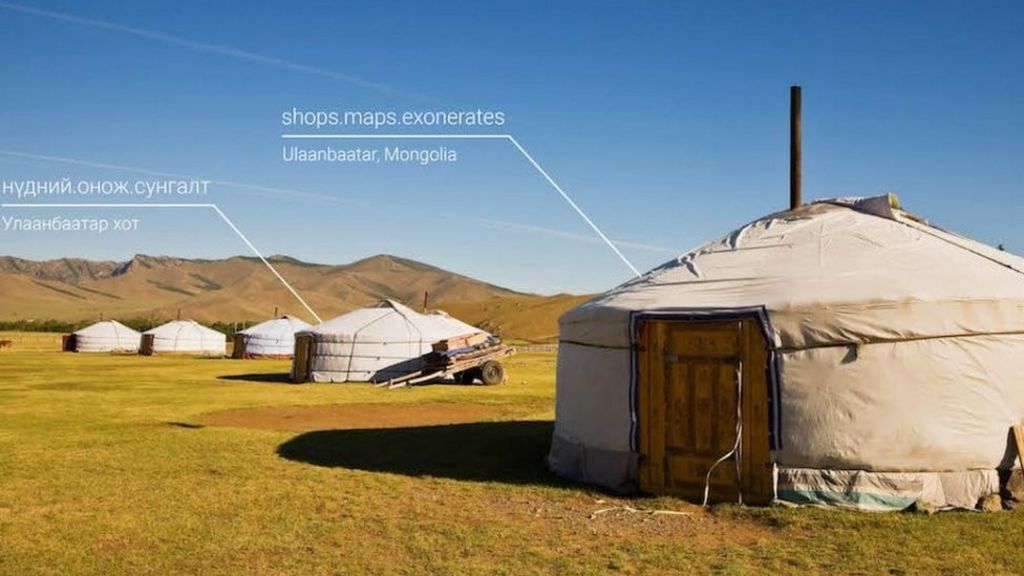TEDGlobal: Three Words That Give People An Address

 Image copyright
What3Words
Image copyright
What3Words
Groceries, post and even pizza are now being delivered to remote parts of the world, previously cut off because they lacked an address.
In Mongolia, people can apply for a bank account using three words to identify where they live.
The system divides the world into 57 trillion 3m sq (9.8ft sq) squares, each with a unique three-word address.
What3words was at Arusha, Tanzania's TEDGlobal conference, updating its effort to give "everyone an address".
"Without an address you might as well not exist," said the UK start-up's co-founder Chris Sheldrick.
"So many services that people take for granted such as applying for a bank account or a utility require an address. For some it is either impossible or a huge struggle to get these things."
A charity in Durban, South Africa, is using the system to provide three-word addresses for 11,000 pregnant women.
"They would previously call an ambulance and it would take hours to find them. Now they can just call and give the three-word address," said Mr Sheldrick.
Domino's Pizza is using the system to deliver pizzas in the Caribbean island of St Maarten. (One of its own addresses on the island is flout.appraiser.interpreter).
What3words has just signed a deal with Khan bank in Mongolia that will allow residents to put the three words that make up their location on a form when applying for a bank account.
"The safe and secure delivery of credit cards to the hands of our customers is critical for us," said Javkhlan Turmunkh, deputy chief executive of Khan Bank.
"Considering the fact that addresses supplied by our customers are often not recognised by mapping platforms, we have chosen to use three-word addresses besides conventional postal addresses in our card delivery. This means that no matter where our customers live, we will be able to deliver cards safely."
Earlier this month, What3Words also signed a deal with the Nigerian postal system.
Nigeria is one of Africa's biggest economies, with more than 180 million people - but only 20% of its inhabitants are able to receive their mail at home. The Nigerian Post and Telecommunications Service has set a target to increase this to more than 70% within the next two years.
The system has already been adopted by postal services in Mongolia, Ivory Coast, Tonga and the Solomon Islands.
Simple solution
Chris Sheldrick began the firm in 2013, following a 10-year career as a musician.
"Every day we would go somewhere new and people always got lost. I tried getting my band to use GPS co-ordinates but they were resistant or typed the co-ordinates wrong.
"I started chatting with a friend who was a mathematician about how we could come up with something that was simple."
They came up with a mathematical formula and list of 40,000 words. Initially in English, the system has now been translated into 14 languages.
What3Words has, however, faced criticism, not least for the restrictions it places on how its data is used and the fact it charges companies to incorporate its service into other products.
And despite the progress outlined at TEDGlobal, the platform has a long way to go before it could be described as being mainstream.
Edward Anderson, chief technologist at the World Bank in Tanzania has looked into customising the system to make it easier to deliver textbooks to secondary schools and for identifying broken water pumps around the country.
"It is a neat idea but it is not immediately obvious what the problem is. In order to look up the three words you need to have GPS co-ordinates so it is not about figuring out where you are but more about telling other people where you are," he said.
He said that there could be a market for the system for voice-activated services.
"You could speak your address to self-driving cars or to make drone deliveries."
From Chip War To Cloud War: The Next Frontier In Global Tech Competition
The global chip war, characterized by intense competition among nations and corporations for supremacy in semiconductor ... Read more
The High Stakes Of Tech Regulation: Security Risks And Market Dynamics
The influence of tech giants in the global economy continues to grow, raising crucial questions about how to balance sec... Read more
The Tyranny Of Instagram Interiors: Why It's Time To Break Free From Algorithm-Driven Aesthetics
Instagram has become a dominant force in shaping interior design trends, offering a seemingly endless stream of inspirat... Read more
The Data Crunch In AI: Strategies For Sustainability
Exploring solutions to the imminent exhaustion of internet data for AI training.As the artificial intelligence (AI) indu... Read more
Google Abandons Four-Year Effort To Remove Cookies From Chrome Browser
After four years of dedicated effort, Google has decided to abandon its plan to remove third-party cookies from its Chro... Read more
LinkedIn Embraces AI And Gamification To Drive User Engagement And Revenue
In an effort to tackle slowing revenue growth and enhance user engagement, LinkedIn is turning to artificial intelligenc... Read more

